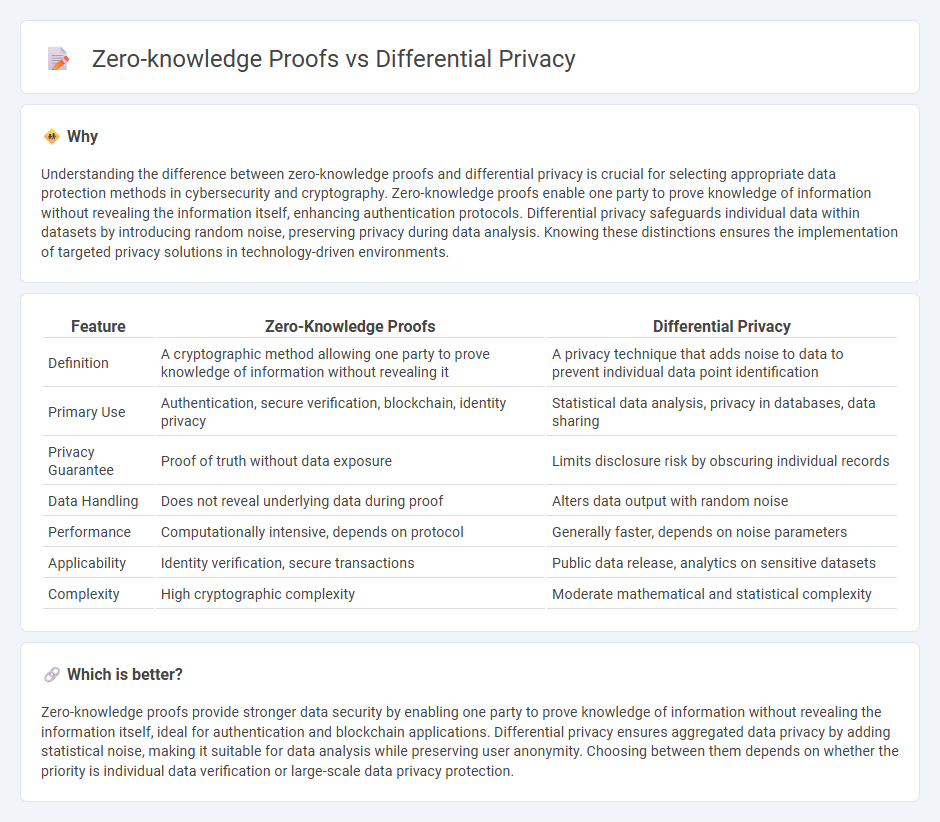
Zero-knowledge proofs enable one party to verify information without revealing the underlying data, enhancing security in blockchain and cryptographic applications. Differential privacy injects carefully calibrated noise into datasets, protecting individual privacy while allowing meaningful statistical analysis. Explore how these advanced technologies balance transparency and confidentiality in modern data ecosystems.
Why it is important
Understanding the difference between zero-knowledge proofs and differential privacy is crucial for selecting appropriate data protection methods in cybersecurity and cryptography. Zero-knowledge proofs enable one party to prove knowledge of information without revealing the information itself, enhancing authentication protocols. Differential privacy safeguards individual data within datasets by introducing random noise, preserving privacy during data analysis. Knowing these distinctions ensures the implementation of targeted privacy solutions in technology-driven environments.
Comparison Table
| Feature | Zero-Knowledge Proofs | Differential Privacy |
|---|---|---|
| Definition | A cryptographic method allowing one party to prove knowledge of information without revealing it | A privacy technique that adds noise to data to prevent individual data point identification |
| Primary Use | Authentication, secure verification, blockchain, identity privacy | Statistical data analysis, privacy in databases, data sharing |
| Privacy Guarantee | Proof of truth without data exposure | Limits disclosure risk by obscuring individual records |
| Data Handling | Does not reveal underlying data during proof | Alters data output with random noise |
| Performance | Computationally intensive, depends on protocol | Generally faster, depends on noise parameters |
| Applicability | Identity verification, secure transactions | Public data release, analytics on sensitive datasets |
| Complexity | High cryptographic complexity | Moderate mathematical and statistical complexity |
Which is better?
Zero-knowledge proofs provide stronger data security by enabling one party to prove knowledge of information without revealing the information itself, ideal for authentication and blockchain applications. Differential privacy ensures aggregated data privacy by adding statistical noise, making it suitable for data analysis while preserving user anonymity. Choosing between them depends on whether the priority is individual data verification or large-scale data privacy protection.
Connection
Zero-knowledge proofs and differential privacy both enhance data security by minimizing information exposure during verification and analysis processes. Zero-knowledge proofs enable one party to prove a statement's truth without revealing underlying data, while differential privacy adds controlled noise to datasets to protect individual privacy against re-identification. Together, they form complementary tools that safeguard sensitive information in cryptographic protocols and privacy-preserving data analytics.
Key Terms
Noise Injection
Differential privacy protects individual data by injecting carefully calibrated noise into datasets, ensuring statistical analysis remains accurate while obscuring specific entries. Zero-knowledge proofs allow one party to prove knowledge of a secret without revealing the secret itself, relying on cryptographic protocols rather than noise addition. Explore the nuances between noise injection in differential privacy and cryptographic techniques in zero-knowledge proofs to deepen your understanding.
Cryptographic Proofs
Differential privacy ensures data privacy by adding controlled noise to datasets, preventing the identification of individuals while enabling aggregate data analysis. Zero-knowledge proofs allow one party to prove knowledge of a secret or validity of a statement without revealing the information itself, enhancing privacy in cryptographic protocols. Explore the nuanced roles and applications of these cryptographic proofs to safeguard sensitive information effectively.
Data Utility
Differential privacy enhances data utility by injecting calibrated noise, enabling statistical analysis while protecting individual information, balancing privacy and data accuracy. Zero-knowledge proofs preserve data utility by allowing verification of specific facts without revealing underlying data, ensuring confidentiality without compromising usability. Explore how these methods optimize data utility in privacy-preserving technologies.
Source and External Links
Differential privacy - Differential privacy is a mathematically rigorous framework designed to release statistical information about datasets while protecting the privacy of individual data subjects by injecting carefully calibrated noise to prevent identifying any single individual from the output.
What Is Differential Privacy? - Differential privacy provides strong privacy guarantees by adding mathematical noise to data analyses so that an adversary cannot determine whether any single individual's data is included in the dataset or distinguish their data after analysis.
Differential Privacy for Privacy-Preserving Data Analysis - Differential privacy ensures that statistical results from data analyses remain nearly the same whether or not any individual's data is included, controlled by a privacy parameter controlling noise magnitude to balance privacy and data utility.
 dowidth.com
dowidth.com